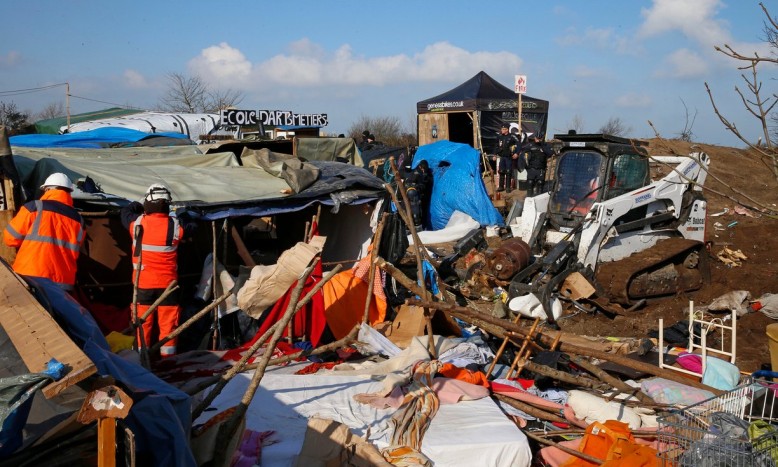Quelle: The Guardian
Desperate refugees are taking greater risks to get to Britain, charity workers warn, after lorries packed with people stopped in Kent
The demolition of refugee camps in Calais has caused an increase in the number of asylum seekers trying to cross illegally into Britain in recent weeks, aid workers in the French port city have claimed.
On Monday and again on Wednesday lorries packed with refugees were stopped by police in Kent triggering alarm about the strength of security checks at the British border with France and Belgium following the Brussels attacks.

French police patrol as workers demolish makeshift shelters at the ‘Jungle’ camp in Calais last week. Photograph: Pascal Rossignol/Reuters
A lorry was stopped at a business park near Dartford Crossing on Monday with 21 Iranian and Iraqi adults and five children inside. Two days later, 24 men, one woman and a boy, were found in the back of a refrigerated truck in Canterbury.
Less than half of lorries coming from Calais, Dunkirk and the Eurotunnel terminal at Coquelles are fully screened by UK immigration officials, according to the Immigration Services Union (ISU), whose members staff the UK borders.
Earlier this month French authorities restarted the dismantling of parts of the “Jungle” camp where an estimated 3,500 people were living. Many of those left behind fear their shelters will be next and are taking greater risks to cross into the UK.
“There has been a big increase in the numbers crossing since the second eviction of the camp which finished last Wednesday,” said Olivia Long, a worker with the Calais-based UK charity Help Refugees. “There is a sense of desperation now about getting across the border. There is increased fear of what might come next. People are worried they are going to destroy this half of the ‘Jungle’ in the coming weeks. Some are deciding to spend their savings to get across the border.”
The cost of getting across in the back of a truck varies from €400 (£315) to as much as €10,000, she said, with the smugglers varying their price depending on refugees’ means.
The Home Office said that the rate at which people were being caught attempting to cross the channel illegally has increased dramatically since last year. In the the financial year 2014-15 UK border force officers at port controls in France and Belgium foiled 39,546 attempts to cross while in the three-month period from last April to July 30,629 attempts were stopped.
British immigration officials in France are supplied with carbon dioxide probes and sniffer dogs to help them check trucks for human cargo. They also have x-ray scanners but it takes about an hour to run a scan so few can be done without the ports grinding to a halt, said Lucy Moreton, general secretary of the ISU.
She said: “We are seeing a lot more [people smuggling] than we saw two years ago but it has been running at the rate we have seen recently for at least a year.”
British lorry drivers have reported an increase in migrants using the services of people traffickers to smuggle them across the border.
“There are more and more organised gangs getting people on board trucks,” said Kate Gibbs, a spokesperson for the Road Haulage Association. “There are drivers who have witnessed this and have seen money changing hands.”
The impact on social services is being felt in Kent. In the first three days of this week, 10 unaccompanied children arrived from mainland Europe through the Channel Tunnel or by ferry and were taken into care by the county council. Since 8 February, 44 under-18s arrived, with the largest number from Iraq followed by Afghanistan, Eritrea and Syria.
In May 2013 Kent had just 98 asylum-seeking children in its care, but that number multiplied to 730 by September 2015. The council is forecasting a £6.2m shortfall in funds to cover the costs of unaccompanied minors seeking asylum.
Large numbers of far-right and anti-immigration protesters are scheduled to march through Dover on Saturday 2 April, with anti-fascist groups planning to confront them. A demonstration in January turned violent and 32 were arrested.
